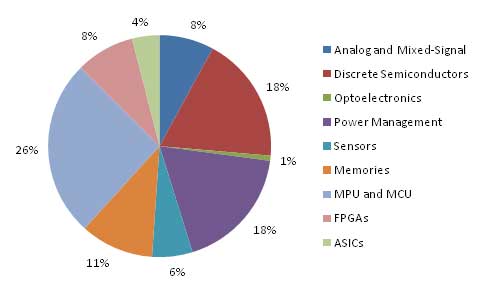The market to Grow on Emerging Commercial off the Shelf (COTS) ICs Demand from Consumer Electronics and Healthcare Segment.
Radiation hardening (Rad-Hard) is the process of developing electronic components that continue to remain unaffected by damage caused by radiations which come across in high-altitude flights, around nuclear reactors, particle accelerators, during nuclear accidents or nuclear warfare or the space. Radiation tolerant (Rad-Tolerant) devices are those which can operate efficiently when exposed to radiation only when certain precautions and mitigations are taken care of.Companies like STMicroelectronics, Texas Instruments, IRC, Atmel, Microsemi and so on are the key players in the COTS IC space. Xilinx is a key player in the FPGA space, Unicircuit in PCBs, Novocell in non-volatile memory, Triad semiconductor in mixed-signal/reconfigurable ASIC as examples of this kind of specialization.
Space, Military and Aerospace are the primary end user segments for the global Radiation hardened and Rad-tolerant markets. While the budgets for space programmes have decreased from governments across nations, the demand for radiation hardened components has not slowed down. As it is even more critical for the space agencies to launch mission critical satellites and rockets, with reduced funding, the stakes have increased. Customers are hence demanding higher Radiation tolerant products where earlier lesser radiation resistant components would have sufficed. IndustryARC estimates the global Radiation hardened electronics market to grow at 8.95% during 2014 – 2019 to reach $1.05bn in 2019, and the radiation tolerant electronic devices and components (EDC) market is estimated to grow at around 5.35% during the same forecast period.

Microprocessors, memory, sensor, ASICs, FPGAs, discrete semiconductors, optoelectronics, analog and mixed signal SoCs are the main components which are radiation hardened. Microprocessors and microcontrollersoccupieda major share in the global rad-hard and rad-tolerant market in 2014. This segment is estimated to grow at a CAGR of 7.27% during the forecast period to be the fastest growing segment as it forms an integral part of rad-hard devices, thereby, making it an established yet fast growing component. The market for ASICs is alsoprojected to witness high growth with a CAGR of6.86% through 2019.
Table of contents and insights:
Radiation tolerant electronics along with radiation hardened electronics are critical components of airplanes as the planes get increasingly sophisticated and automated. Airplanes generally fly in the low-earth orbit and in atmosphere where radiation has the maximum effects and this necessitates the need to use rad-tolerant and rad-hard electronics in them. Commercial airplanes are hence expected to continue being a major contributor to this market and also in providing continuous impetus to the industry growth.
Military programs demand higher radiation tolerant components compared to the space programs. Both the agencies however are currently demanding reliability with respect to Enhanced Low Dose Rate Sensitivity (ELDRS) and SEU immunity. Also high on the list of requirements is re-configurability. While ASICs are not capable of providing reconfiguration, the FPGAs are also only one-time programmable. Companies like Xilinx have however launched products like the Virtex-5QV FPGA which can be reprogrammed once the satellite or mission is launched from the command station, thus giving flexibility to the product functioning. This feature is highly critical in the current time when multiple satellites are being launched in one mission.
About IndustryARC
IndustryARC is a research and consulting firm that publishes more than 20 reports every month in various industries, such as Agriculture, Automotive, Automation & Instrumentation, Chemicals and Materials, Energy and Power, Electronics, Food & Beverages, Information Technology, Life sciences & Healthcare. Contact us to find out how we can help you today!
Email: sanjay.matthews@industryarc.com
http://www.industryarc.com







